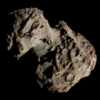Comet Morehouse
 Comet Morehouse depicted from a 1908 postcard.[1] | |
| Discovery | |
|---|---|
| Discovered by | Daniel W. Morehouse |
| Discovery site | Yerkes Observatory |
| Discovery date | 1 September 1908 |
| Designations | |
| 1908c 1908 III | |
| Orbital characteristics[2] | |
| Epoch | 30 October 1908 (JD 2418244.5) |
| Observation arc | 88 days |
| Number of observations | 137 |
| Perihelion | 0.945 AU |
| Semi-major axis | –1,058.049 AU |
| Eccentricity | 1.00089 |
| Inclination | 140.174° |
| 104.459° | |
| Argument of periapsis | 171.584° |
| Last perihelion | 26 December 1908 |
| Earth MOID | 0.0668 AU |
| Jupiter MOID | 2.3183 AU |
Comet Morehouse (modern formal designation: C/1908 R1) was a bright, non-periodic comet discovered by US astronomer Daniel Walter Morehouse on September 1, 1908 (the discovery photograph was taken on September 1, but the comet was not noticed until the following day), at Yerkes Observatory in Williams Bay, Wisconsin. Morehouse was a graduate student at the time.[3][4] It was unusual in the rapid variations seen in the structure of its tail.[5][6] At times, the tail seemed to split into up to six separate tails;[citation needed] at others, the tail appeared completely detached from the head of the comet.[7] The tail was further unusual in that it formed while the comet was still 2 AU away from the Sun[7] (where distances of 1.5 AU are more usual)[citation needed], and that there was a high concentration of the CO+ ion in its spectrum.[8]
As is typical for comets fresh from the Oort Cloud, its orbital solution is more or less parabolic;[4] if its orbit is in fact closed, it will likely not return for millions of years.
References
[edit]- ^ "Antique Astronomy Postcards: Comet Morehouse - 1908". Retrieved 8 April 2021.
- ^ "C/1908 R1 (Morehouse) – JPL Small-Body Database Lookup". ssd.jpl.nasa.gov. Jet Propulsion Laboratory. Retrieved 7 November 2024.
- ^ Fox, P. (June 1941). "Daniel Walter Morehouse". Popular Astronomy. 49: 289. Bibcode:1941PA.....49..289F. Retrieved 2 September 2024.
- ^ a b van Biesbroeck, G. (August 1937). "The definitive orbit of comet Morehouse 1908 III". Publications of the Yerkes Observatory. 8: 1–157. Bibcode:1937PYerO...8....5V. Retrieved 8 September 2024.
- ^ Miller, J. A. (1908). "Photographic Observations of Comet Morehouse". Popular Astronomy. 16: 653. Bibcode:1908PA.....16..653M. Retrieved 8 September 2024.
- ^ Motherwell, R. M. (1910). "Appendix D: Double star measures. Photographs of Comet Morehouse, Occultations of Stars by the Moon. Field Instruments. Aberrations of the Stellar Camera Objective". Dominion Astrophysical Observatory Annual Report. 5: 257–554. Bibcode:1910DAOAR...5..257M. Retrieved 8 September 2024.
- ^ a b Niedner, M. B., Jr. (October 1980). "Interplanetary gas. XXV - A solar wind and interplanetary magnetic field interpretation of cometary light outbursts". Astrophysical Journal. 241 (1). Bibcode:1980ApJ...241..820N. doi:10.1086/158393. Retrieved 8 September 2024.
{{cite journal}}: CS1 maint: multiple names: authors list (link) - ^ Jackson, W. M.; Donn, B. (1968). "Photochemical effects in the production of cometary radicals and ions". Icarus. 8: 270–280. doi:10.1016/0019-1035(68)90079-1. Retrieved 8 September 2024.
External links
[edit] Media related to Comet Morehouse at Wikimedia Commons
Media related to Comet Morehouse at Wikimedia Commons- Photographs of Comet Morehouse from the Lick Observatory Records Digital Archive, UC Santa Cruz Library's Digital Collections Archived 2016-03-04 at the Wayback Machine
- Morehouse at the JPL Small-Body Database


